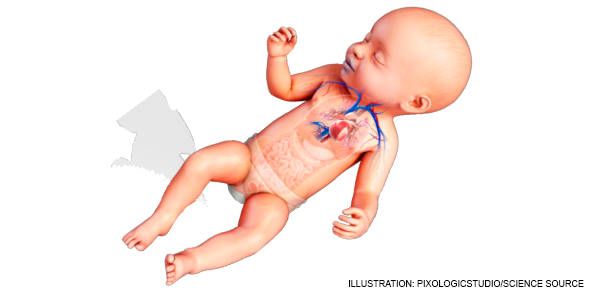A New Dawn for Infant Cardiac Care
A novel development in paediatric cardiology has surfaced, providing a ray of hope for infants suffering from congenital heart defects. A novel biodegradable patch developed by researchers at the University of Colorado Anschutz Medical Campus has the potential to completely change the way these potentially fatal illnesses are treated.
Congenital heart defects are the most common birth defect, affecting about 1% of newborns globally. These defects result from aberrant heart development that occurs during foetal development. Some defects are treatable with medication or surgery, but others require complex and invasive procedures that carry a high risk to newborns.

The recently created biodegradable patch, which challenges the limitations of conventional surgical repairs, is a ray of hope. It is made from a combination of biocompatible materials and cells. This clever patch is made to progressively break down over time, blending in with the baby’s own tissues and eventually being replaced by normal, functioning heart tissue.
Lead researcher Dr. [name] said, “This represents a monumental breakthrough in the field of paediatric cardiology.” “Our biodegradable patch holds immense potential to transform the treatment of congenital heart defects, offering a less invasive and more durable solution for infants.”
Positive outcomes from preclinical research have shown how well the patch fixes heart defects in animal models. In order to expedite the delivery of this revolutionary treatment to patients, researchers are preparing for clinical trials in human infants with great anticipation.
The Benefits of the Biodegradable Patch Revealed
With so many potential benefits, the biodegradable patch becomes a compelling substitute for conventional surgical repairs.
Minimally Invasive: By using minimally invasive techniques to implant the patch, the risk of complications from open-heart surgery is greatly decreased.
Sturdy Repair: As the baby grows, the patch’s design may prevent the need for repeated surgeries because of its long lifespan.
Natural Healing: As the patch gradually deteriorates, the infant’s own tissues are able to regenerate and heal, leading to long-term, natural repair.
Redefining Infant Heart Health’s Future
The biodegradable patch has the potential to significantly improve the lives of infants with congenital heart defects if it is developed and used in clinical settings.
This novel treatment has the potential to:
- Improved Treatment Outcomes: The patch has the potential to greatly enhance treatment outcomes for infants with congenital heart defects by providing a less invasive and more durable repair.
- Decreased Surgical Risks: The patch’s minimally invasive procedures may improve patient safety by reducing the chance of complications.
- Better Quality of Life: Infants who have congenital heart defects repaired successfully may have better long-term health outcomes and a higher quality of life.
Accepting Paediatric Cardiology’s Future
The creation of the biodegradable patch represents a substantial advancement in the care of newborns with congenital cardiac defects. Clinical trials and ongoing research will be used to assess this novel therapy’s long-term results, safety, and effectiveness. The potential impact of technological advancements on the lives of infants with congenital heart defects is profoundly transformative.
The promise of less invasive, more durable, and effective treatments for congenital heart defects shines brightly for paediatric cardiology’s future. The biodegradable patch is proof of the creativity and commitment of researchers and medical professionals who put forth great effort to enhance the quality of life for newborns and their families.


